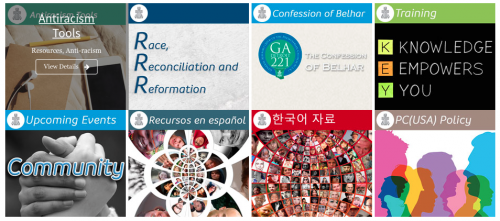Presbyterians quote from the Confession of Belhar and remember their baptism after violence in Charlottesville
by Paul Seebeck | Presbyterian News Service
 LOUISVILLE – Meg Rift, associate for curriculum development for Congregational Ministries Publishing, could not ignore images she saw on social media sites of Saturday’s violence in Charlottesville. The sights included angry men with torches and guns projecting a message of hate and counter-demonstrators, including clergy and people of all faiths, with arms linked in solidarity singing to drown out the hate rhetoric.
LOUISVILLE – Meg Rift, associate for curriculum development for Congregational Ministries Publishing, could not ignore images she saw on social media sites of Saturday’s violence in Charlottesville. The sights included angry men with torches and guns projecting a message of hate and counter-demonstrators, including clergy and people of all faiths, with arms linked in solidarity singing to drown out the hate rhetoric.
On Sunday, Rift noticed that Presbyterians across the country were posting excerpts from sermons, liturgies and prayers on social media, quoting the Confession of Belhar. Fifty years after it was birthed in South Africa by the Dutch Mission Church during its battle against apartheid, Belhar was added to the Presbyterian Church (U.S.A.) Book of Confessions at the 222nd General Assembly (2016).
“Belhar is about what the church says about racial injustice,” says Rift, “and about what we can do about justice and reconciliation. If we didn’t think it was relevant to us before, it certainly is now, especially considering its call to justice.”
Under the direction of the 222nd General Assembly (2016), which approved Belhar, the Communications Departments of the church’s six agencies are engaged in an ongoing electronic campaign called Facing Racism to share free antiracism resources with the greater church. Included at facing-racism.pcusa.org is a section on Belhar.
The PC(USA) store also carries study guides on the Confession of Belhar for participants and leaders.
“The adaption of the Belhar Confession into our constitution builds upon the Confession of 1967 which also deals with racism in our society and God’s call to us for it to be eradicated,” says Chip Hardwick, Director of PC(USA) Theology, Formation & Evangelism ministries.
“The challenge is for our deeds to line up with our words. We need to pray that the Spirit will equip us to embody the resistance to white supremacy and racism and not simply say that we are against these evils. After all, faith without works is dead.”
For David Gambrell in Theology and Worship in the PC(USA), the white supremacist violence in Charlottesville, has him thinking deeply about the sacrament of baptism. He believes baptism is the foundation of all Christian ministries of justice and reconciliation.
“When believers or their children are baptized, what are they asked? ‘Trusting in the gracious mercy of God, do you turn from the ways of sin and renounce evil and its power in the world?’”
Part of “remembering our baptism is to remember our calling to renounce and resist evil in all its forms — including the evil of racism,” he says. “Baptism is a sign of equality as Paul taught. Christ breaks down divisions between us.”
Gambrell adds that baptism represents our initiation “into God’s realm of justice, righteousness and peace, where we are joined with the multicultural multitude of those God has redeemed.”
The following are additional worship and Presbyterian Disaster Assistance resources to help congregations live out their call of renouncing and resisting the evil of racism.
Worship Resources
- Draft excerpt from the Justice and Reconciliation section of the forthcoming Presbyterian Book of Common Worship (WJKP, 2018). It provides commentary on worship and justice, a simple service for justice and reconciliation, and a variety of suggested readings, hymns and prayers.
- Glory to God: The Presbyterian Hymnal (WJKP, 2013) has a section on Justice and Reconciliation (749–774) that contains many hymns and songs addressing the sin for racism and proclaiming God’s call to justice and dignity for all people.
- The Hymn Society has provided a list of “Prophetic Hymns on Race, Unity and Peace.”
PDA Resources
- Prayer in the wake of violence in Charlottesville.
- The Trauma Pastoral Care Series (training videos).
- Tapestry: Reweaving the Fabric of Community After Public Violence (documentary).
- Trigger: The Ripple Effect of Gun Violence
- Other prayers/ hymns/worship
- For churches affected by the Charlottesville disaster or future human-caused disasters, PDA has community support grants available for unmet community needs, if requested.
- PDA also has the expertise to help faith leaders meet as a community to help the structure events and space where storytelling and community healing can take place to help address the issues that led to these acts of terror.
Additional Video Resource
- August 2017 Keeping Faith on confronting and engaging in the work of racial justice. Download the entire segment or two individual stories here.
![]() You may freely reuse and distribute this article in its entirety for non-commercial purposes in any medium. Please include author attribution, photography credits, and a link to the original article. This work is licensed under a Creative Commons Attribution-NonCommercial-NoDeratives 4.0 International License.
You may freely reuse and distribute this article in its entirety for non-commercial purposes in any medium. Please include author attribution, photography credits, and a link to the original article. This work is licensed under a Creative Commons Attribution-NonCommercial-NoDeratives 4.0 International License.
Categories: Racial Justice
Tags: anti-racism, antiracism, charlottesville, cmp, Congregational Ministries Publishing, facing racism, pcusa, pda, presbyterian, presbyterian disaster assistance, Presbyterian Publishing Corporation, racism
Ministries: , Theology, Formation & Evangelism, Compassion, Peace and Justice, Presbyterian Disaster Assistance